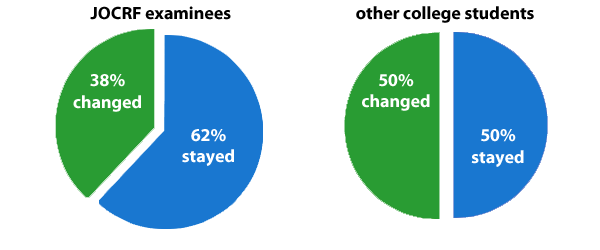
Reports in the media note the difficulties of parents today who are trying to find the best value of higher education for their students. Increasing college costs have made it all the more important for students and parents to make cost effective decisions.
The ACT organization recently noted that whether a student graduates with their original declared major or changes majors is about a 50/50 chance.
Apparently more than half of the time college students change their mind about their major, are often set back in terms of time and need to take more classes, but also money, as taking more classes costs more money.
What about students who have taken the Johnson O’Connor Research Foundation battery of aptitude tests? Do they change majors at the same rate as the average college student?
We set out to answer this question with a survey of students going into their junior year of college. These were students who had tested with us at least three years before, compared to a group of students who had not tested with us at all.
The sample was college students in the class of 2017, 112 who were tested three years ago, and 65 who were not tested by JOC. The students were surveyed the summer before their junior year of college in most cases. We asked if they had declared a college major, if they had ever changed it, when they declared it, and what it was. We also asked how satisfied they were with their current major.
The most notable result was that 62% of students who had tested with JOC continued their declared major while they were at college. The comparison group in the study who had not tested with JOC changed their major 50% of the time, supporting other reports in the media.
Although there are many reasons for a person to change college majors or not, this natural experiment that compares the two groups of students supports the idea that learning about your aptitudes with testing at the Johnson O’Connor Research Foundation might somehow be related to being more decisive about choosing a college major.
















